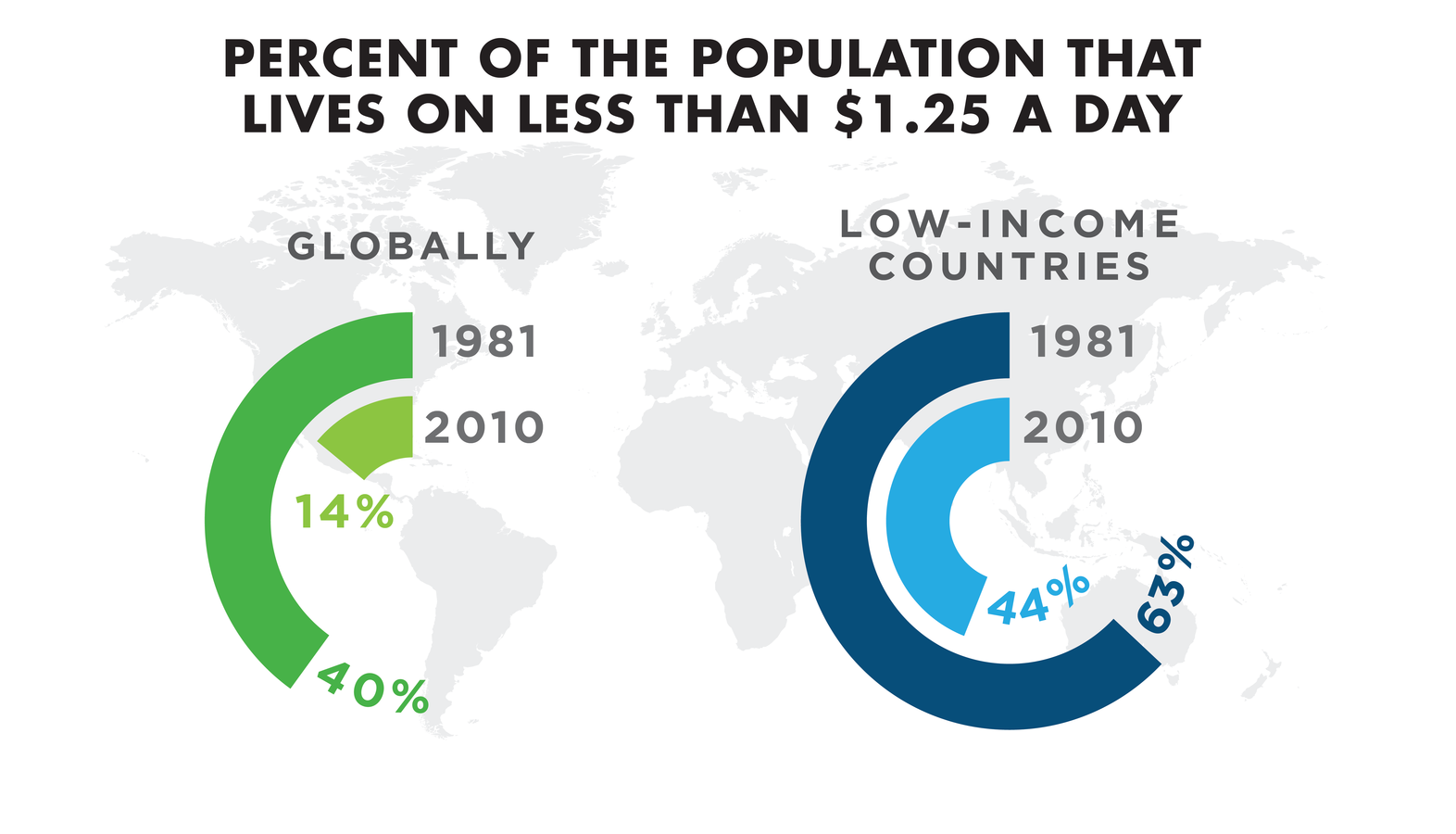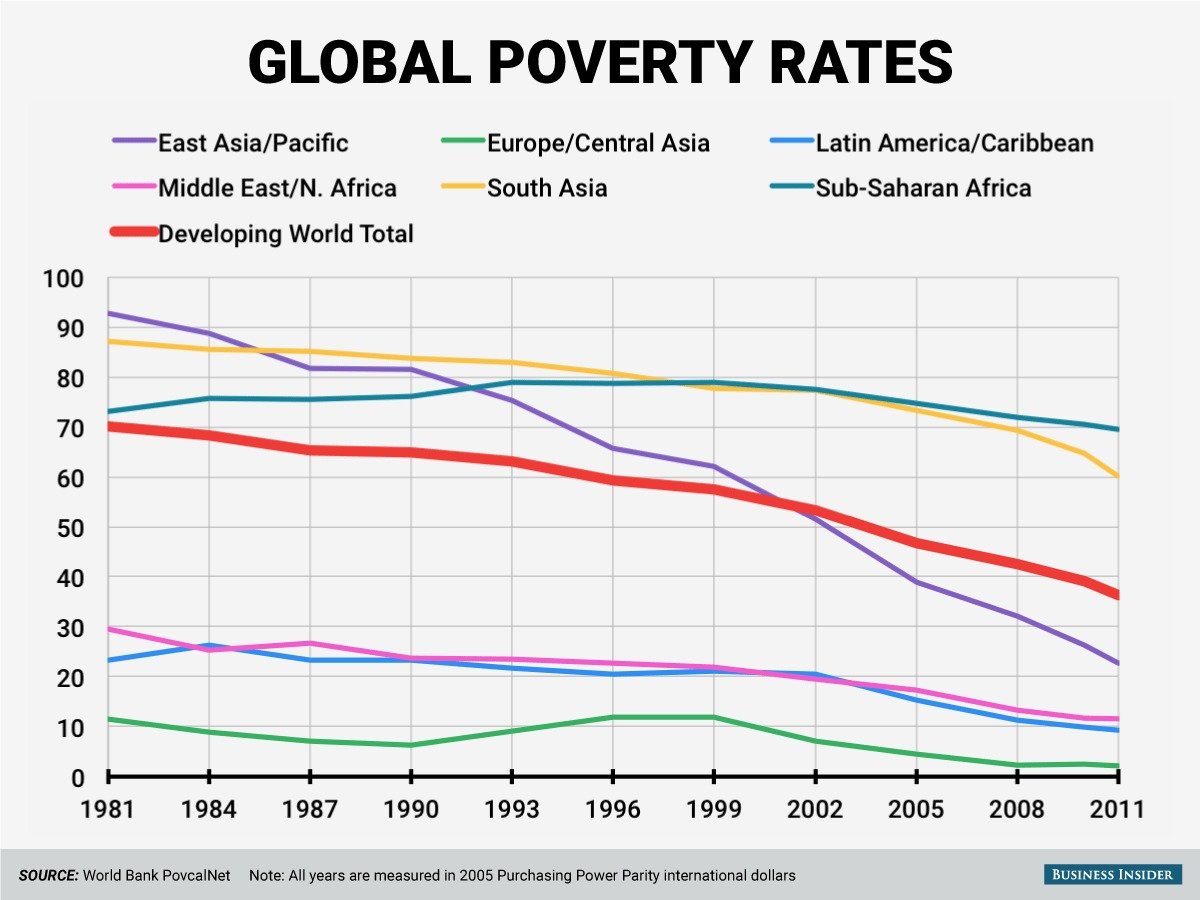World Poverty
How do we define poverty?
How do we measure poverty?
What causes poverty?
How can we alleviate poverty?
What are our obligations with respect to poverty?
Income poverty
Absolute poverty
"a condition characterised by severe deprivation of basic human needs, including food, safe drinking water, sanitation facilities, health, shelter, education and information. It depends not only on income but also on access to services."
– United Nations (1995)
Overall poverty
"lack of income and productive resources to ensure sustainable livelihoods; hunger and malnutrition; ill health; limited or lack of access to education and other basic services; increased morbidity and mortality from illness; homelessness and inadequate housing; unsafe environments and social discrimination and exclusion. It is also characterised by lack of participation in decision making and in civil, social and cultural life. It occurs in all countries..."
– United Nations (1995)



Inequality ≠ Poverty
It is possible for a very unequal society to contain nobody in absolute poverty.
Rawls' Difference Principle
Inequality is justified if it makes those at the bottom better off than they would be in a more equal society.
Bengal, 1971
East Pakistan seeks independence from Pakistan
Pakistan attempts to suppress uprising by declaring civil war and engaging in genocide.
Pakistan fails and a new country, Bangladesh, is formed.
Bangladesh experiences severe fallout from civil war in the form of poverty and famine.
10 million Bengali refugees flee, creating a humanitarian disaster.
Singer
Discusses humanitarian crises, not poverty as such.
What does Singer try to persuade us?
To do certain things to help alleviate famine.
What conclusion does the paper set out to persuade us is true?
Do his arguments transfer to ongoing poverty?
That we ought to give money to help famine.
"In what follows, I shall argue that the way people in relatively affluent countries react to a situation like that in Bengal cannot be justified"
How does Singer persuade us that this claim is true?
Choose initial premises that everyone is likely to share
Show how they validly lead to the conclusion
Predict and defend against potential objections
Propose concrete action that will alleviate famine
Assumptions
An assumption is an unsupported premise
Assumptions can be explicit or implicit
First assumption: Suffering and death from lack of food, shelter and medical care are bad.
Second assumption: If it is in our power to prevent something bad from happening, without thereby sacrificing anything of comparable moral importance, we ought, morally, to do it.
P1: Famine is bad.
P2: If it is in our power to prevent something bad from happening, without thereby sacrificing anything of comparable moral importance, then we ought, morally, to do it.
P3: There are things that are in our power to do to reduce famine that do not require sacrificing anything of comparable moral importance.
P4: We ought, morally, to do those things.
C: The current reaction of affluent countries to famine cannot be justified.
P5: We don't do those things.
(Not conclusion)
"I could even, as far as the application of my argument to the Bengal emergency is concerned, qualify the point so as to make it: if it is in our power to prevent something very bad from happening, without thereby sacrificing anything morally significant, we ought, morally, to do it."
"An application of this principle would be as follows: if I am walking past a shallow pond and see a child drowning in it, I ought to wade in and pull the child out. This will mean getting my clothes muddy, but this is insignificant, while the death of the child would presumably be a very bad thing."
Weaken the premise
Provide a compelling example
How does this help persuade us?
Weakening the premise makes it harder to object to the argument by presenting fringe cases.
For example:
Should I sacrifice sports clothing that my children need for school so that someone in Bengal can have shoes to fetch water in?
The example that Singer provides is compelling because it emphasises the disparity between the luxuries we enjoy and the suffering in Bengal.
Why weaken the overall force of the argument?
Weakening the premise does not actually weaken the argument insofar as it applies to Bengal.
We need to start somewhere.
The weaker the premises of your argument, the more likely they are to be true...
...and the more likely that your argument is sound.
Is distance morally relevant?
Someone might respond to Singer by saying that being near the drowning child is what obliges us to help.
Common discussion in the literature.
"The fact that a person is physically near to us, so that we have personal contact with him, may make it more likely that we shall assist him, but this does not show that we ought to help him rather than another who happens to be further away."
"If we accept any principle of impartiality, universalizability, equality, or whatever, we cannot discriminate against someone merely because he is far away from us (or we are far away from him)."
Is there any principle of impartiality, universalizability, or equality that is compatible with the following:
Help those nearest to you.
Prioritise those in your community.
Family comes first.
The last two are very common across human communities.
If any of these is compatible with any principle with the above features, Singer will be under pressure.
If we adopt these, do we avoid Singer's conclusion?
Is-Ought
The Is/Ought Fallacy occurs when the assumption is made that because things are a certain way, they should always be that way.
For example:
I am a naturally aggressive person, therefore I should act aggressively.
Singer deals with several objections that rest on this fallacy.
Bankers have always received bonuses. It's part of the culture.
"The fact that a person is physically near to us, so that we have personal contact with him, may make it more likely that we shall assist him, but this does not show that we ought to help him rather than another who happens to be further away."
Just because we in fact prioritise people near us, it does not follow that we ought to.
"One objection to the position I have taken might be simply that it is too drastic a revision of our moral scheme. People do not ordinarily judge in the way I have suggested they should. Most people reserve their moral condemnation for those who violate some moral norm, such as the norm against taking another person's property. They do not condemn those who indulge in luxury instead of giving to famine relief."
"If this is an explanation of our common distinction between duty and supererogation, however, it is not a justification of it."
"Since most people are self-interested to some degree, very few of us are likely to do everything that we ought to do. It would, however, hardly be honest to take this as evidence that it is not the case that we ought to do it."
The fact that we won't all do certain things all the time does not affect the claim that we ought to do those things.
"one feels less guilty about doing nothing if one can point to others, similarly placed, who have also done nothing. Yet this can make no real difference to our moral obligations."
The fact that other people act a certain way does not tell me what I ought to do.
The fact that I don't feel guilty does not mean that there is nothing I ought to do.
The fact that other people act a certain way does not tell me what I ought to do.
Certain facts change our obligations, but we cannot derive obligations from facts.
E.g. If someone else is saving the drowning child such that my attempt to do so will make things worse, I am not obliged to help.
"if everyone in circumstances like mine gave £5 to the Bengal Relief Fund, there would be enough to provide food, shelter, and medical care for the refugees; there is no reason why I should give more than anyone else in the same circumstances as I am; therefore I have no obligation to give more than £5."
P1: If everyone in my situation gives £5 then there would be enough to help.
P2: In those circumstances, there is no reason why I should give more than others in my situation.
C: I have no obligation to give more than £5.
A Controversial Claim?
P2: If it is in our power to prevent something bad from happening, without thereby sacrificing anything of comparable moral importance, then we ought, morally, to do it.
If others aren't pulling their weight, we have to pitch in more.
How much do we have to sacrifice to satisfy Singer?
Is it too much?
Back to Poverty
How does Singer's argument transfer to systemic poverty?
There are clearly very bad things happening as a result of poverty.
We also indulge in luxuries whose moral significance is negligible.
Should we give the money we spend on luxuries to foreign aid charities?


"Of course, mitigating circumstances can be adduced – for instance, that if we wear ourselves out through overwork, we shall be less effective than we would otherwise have been. Nevertheless, when all considerations of this sort have been taken into account, the conclusion remains: we ought to be preventing as much suffering as we can without sacrificing something else of comparable moral importance."
Consequentialism always relies on knowing the consequences of our actions.
In the context of a global economy, that is a difficult task.
PIP3: World Poverty
By David Rowthorn (drowthorn)
PIP3: World Poverty
- 399